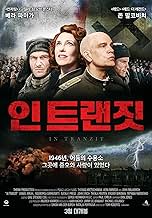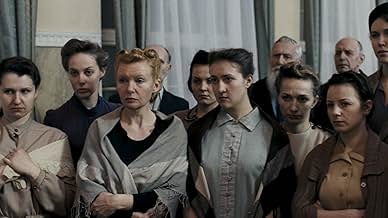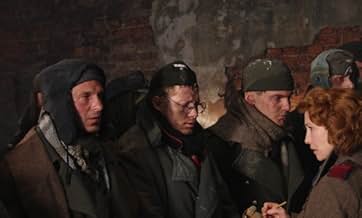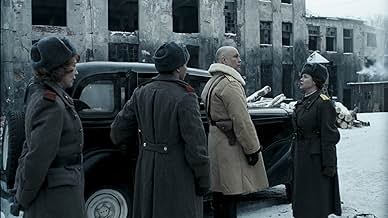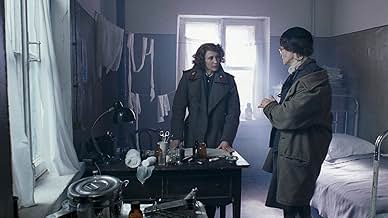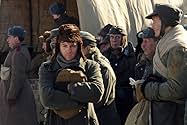VALUTAZIONE IMDb
5,8/10
2862
LA TUA VALUTAZIONE
Dopo la guerra, prigionieri tedeschi vengono trasferiti in un campo sovietico dove incontrano sopravvissute dell'assedio di Leningrado. Le loro vite s'intrecciano in un luogo segnato dalle c... Leggi tuttoDopo la guerra, prigionieri tedeschi vengono trasferiti in un campo sovietico dove incontrano sopravvissute dell'assedio di Leningrado. Le loro vite s'intrecciano in un luogo segnato dalle cicatrici del conflitto.Dopo la guerra, prigionieri tedeschi vengono trasferiti in un campo sovietico dove incontrano sopravvissute dell'assedio di Leningrado. Le loro vite s'intrecciano in un luogo segnato dalle cicatrici del conflitto.
- Regia
- Sceneggiatura
- Star
Sergei Baryshev
- Russian Guard 1
- (as Sergey Baryshev)
Aleksandr Bolshakov
- Captain
- (as Alexander Bolshakov)
Natalya Fisson
- Tamara
- (as Natalia Fisson)
Maksim Gudkov
- Schmidt
- (as Maxim Gudkov)
Recensioni in evidenza
If you have basic knowledge of ww2 and topics that relate to this movie, you won't notice the inaccuracies. But German POWs held by the soviets had a mortality rate of over 90%. The soldiers tied to Leningrad, Stalingrad, Belorussia and any SS would be killed quickly and garunteed.
Also, in the movie they are trying to root out SS. In reality all the SS had a tattoo on them indicating their blood-type and it certified their racial purity. The soviets knew of these tattoos so a quick strip search would quickly weed out the SS.
The Nazis devastated the Slav populations. They killed commissars on sight, killed almost all Russian POWs, destroyed hundreds of German towns, exterminated Russian civilian populations, broke the German-Russian non-aggression pact, sent civilians and prisoners through mine fields and used them as human shields, kidnapped aryan-looking babies for the lebensborne program, Inacted a scorched-earth policy, starved Leningrad into cannibalisn, committed genocide (especially in belorussia and Ukraine and western Russia, allied with Finland, killing off 80% of all Russian 20 year-old males by 1943, and used Slav women/children as human shields while rushing soviets positions... not to mention officially labeling Russians as "untermensch" (sub-human) and treated them with a pest-extermination attitude while refusing to acknowledge the Geneva convention; in some cases burning barns full of people and forcing POWs to lay down side by side while they freeze them to death water in order to make a sturdy ice-road.... whole areas of Russia were decimated beyond repair, hundreds of thousands of families were exterminated, countless Slavs became slaves, whole regions were burned and bulldozed to nothing, their Jews were almost wiped out and multiple generations of Russians suffered life-long ptsd.
Factoring all that it is clear to see that the Russians were unrealistically civil and empathetic towards the Germans in this movie. The women working in this camp would almost surely be widows and childless due to the war.
I don't support the treatment of German POWs and civilians after the war.... but to say I can't understand the ruthlessness of the Bolsheviks towards the Germans, would be a lie. I can't imagine the pain that nation experienced while trying to rebuild, recover and re-identify.
Also, in the movie they are trying to root out SS. In reality all the SS had a tattoo on them indicating their blood-type and it certified their racial purity. The soviets knew of these tattoos so a quick strip search would quickly weed out the SS.
The Nazis devastated the Slav populations. They killed commissars on sight, killed almost all Russian POWs, destroyed hundreds of German towns, exterminated Russian civilian populations, broke the German-Russian non-aggression pact, sent civilians and prisoners through mine fields and used them as human shields, kidnapped aryan-looking babies for the lebensborne program, Inacted a scorched-earth policy, starved Leningrad into cannibalisn, committed genocide (especially in belorussia and Ukraine and western Russia, allied with Finland, killing off 80% of all Russian 20 year-old males by 1943, and used Slav women/children as human shields while rushing soviets positions... not to mention officially labeling Russians as "untermensch" (sub-human) and treated them with a pest-extermination attitude while refusing to acknowledge the Geneva convention; in some cases burning barns full of people and forcing POWs to lay down side by side while they freeze them to death water in order to make a sturdy ice-road.... whole areas of Russia were decimated beyond repair, hundreds of thousands of families were exterminated, countless Slavs became slaves, whole regions were burned and bulldozed to nothing, their Jews were almost wiped out and multiple generations of Russians suffered life-long ptsd.
Factoring all that it is clear to see that the Russians were unrealistically civil and empathetic towards the Germans in this movie. The women working in this camp would almost surely be widows and childless due to the war.
I don't support the treatment of German POWs and civilians after the war.... but to say I can't understand the ruthlessness of the Bolsheviks towards the Germans, would be a lie. I can't imagine the pain that nation experienced while trying to rebuild, recover and re-identify.
A decent film about a group of German POWs are accidentally sent to a female-run Soviet prison camp.
Drama post-WWII film about German soldiers in a concentration camp with superb interpretation and tension enough.
Directed by Tom Roberts from a screenplay by Natalia Nightingale-Grey and Simon van der Borgh, In Tranzit has the following synopsis: Set in Leningrado, 1946, in the chaotic aftermath of WWII, a group of German prisoners are sent to a female transit camp by the cruel Russian Commander Pavlov (John Malkovich). When the guards are given the task of weeding out the SS officers, they play a bitter game of cat and mouse with the prisoners. Natalia (Vera Farmiga) and the inmate Max (Thomas Kretschmann) feel a great attraction for each other while the prisoner Klaus (Daniel Brühl) attempts to convince Max to denounce some prisoners to please and obtain privileges from the Russians. Each group slowly learns that situations are not what they seem; prejudices are sometimes unjustly held; and love can be found in even the harshest places. From her greatest enemy came her greatest love !
From the beginning the film seems to develop like the typical story of concentration camps with the particularity that prisoners are Nazis, the plot then takes an intriguing tack when they must cope with the hostility of the Soviet female inmates and guards, suffering a undisguised resentment from their previous criminal activities. The film turns out to be decent enough, dealing primarily with the relationships between German prisoners and their guards, who are mostly Russian women, adding brief intrigues about who the snitch is. This is a well-paced and well-acted movie. However, it is marred by a terrible ending with a bizarre and twisted plot that is not well developed.
.Alongside the two main characters: Vera Farmiga, Thomas Kretschmann, John Malkovich giving engaging performances, there is a long list of supporting characters - many of them in their early days and who would later go on to develop successful careers, such as: Daniel Brühl, Natalie Press, Patrick Kennedy and John Lynch.
This unknown film was professionally directed by Tom Roberts , but it failed at the boxoffice, and that's why it was distributed straight to DVD in several countries. Tom is a craftsman, writer, producer and director who has filmed both for television and the big screen, including his following works: ¨Hebron Exposed - A Weapon of Life¨, ¨Every Last Child¨, Alfred and Jakobine¨, ¨Mandela: The Prison Years¨, ¨Ghosts of the 7th Cavalry¨, ¨ Frontline¨, ¨Dispatches¨, ¨Wide Angle¨, ¨ Witness¨ , ¨Time watch¨, among others. In tranzit (2008) rating; 6.5/10. The movie will appeal to WWII enthusiasts.
Directed by Tom Roberts from a screenplay by Natalia Nightingale-Grey and Simon van der Borgh, In Tranzit has the following synopsis: Set in Leningrado, 1946, in the chaotic aftermath of WWII, a group of German prisoners are sent to a female transit camp by the cruel Russian Commander Pavlov (John Malkovich). When the guards are given the task of weeding out the SS officers, they play a bitter game of cat and mouse with the prisoners. Natalia (Vera Farmiga) and the inmate Max (Thomas Kretschmann) feel a great attraction for each other while the prisoner Klaus (Daniel Brühl) attempts to convince Max to denounce some prisoners to please and obtain privileges from the Russians. Each group slowly learns that situations are not what they seem; prejudices are sometimes unjustly held; and love can be found in even the harshest places. From her greatest enemy came her greatest love !
From the beginning the film seems to develop like the typical story of concentration camps with the particularity that prisoners are Nazis, the plot then takes an intriguing tack when they must cope with the hostility of the Soviet female inmates and guards, suffering a undisguised resentment from their previous criminal activities. The film turns out to be decent enough, dealing primarily with the relationships between German prisoners and their guards, who are mostly Russian women, adding brief intrigues about who the snitch is. This is a well-paced and well-acted movie. However, it is marred by a terrible ending with a bizarre and twisted plot that is not well developed.
.Alongside the two main characters: Vera Farmiga, Thomas Kretschmann, John Malkovich giving engaging performances, there is a long list of supporting characters - many of them in their early days and who would later go on to develop successful careers, such as: Daniel Brühl, Natalie Press, Patrick Kennedy and John Lynch.
This unknown film was professionally directed by Tom Roberts , but it failed at the boxoffice, and that's why it was distributed straight to DVD in several countries. Tom is a craftsman, writer, producer and director who has filmed both for television and the big screen, including his following works: ¨Hebron Exposed - A Weapon of Life¨, ¨Every Last Child¨, Alfred and Jakobine¨, ¨Mandela: The Prison Years¨, ¨Ghosts of the 7th Cavalry¨, ¨ Frontline¨, ¨Dispatches¨, ¨Wide Angle¨, ¨ Witness¨ , ¨Time watch¨, among others. In tranzit (2008) rating; 6.5/10. The movie will appeal to WWII enthusiasts.
First of all, anyone should watch this movie not because of the plot, but because one needs to learn history from alternative viewpoints.
What is remarkable about this movie, is that it depicts accurately the Soviet policy of killing any prisoner of war by starving, exposure, sentenced execution of simply random killing. One of the dark secrets of the Allies is that they never respected any Geneva conventions and were notorious for committing crimes against humanity.
So some prisoners (the minority) did survive because of luck. There were a few righteous among the nations that helped them with extra food or clothing at a great risk for themselves, so I am glad this movie pays tribute for those compassionate ladies.
What is remarkable about this movie, is that it depicts accurately the Soviet policy of killing any prisoner of war by starving, exposure, sentenced execution of simply random killing. One of the dark secrets of the Allies is that they never respected any Geneva conventions and were notorious for committing crimes against humanity.
So some prisoners (the minority) did survive because of luck. There were a few righteous among the nations that helped them with extra food or clothing at a great risk for themselves, so I am glad this movie pays tribute for those compassionate ladies.
I expected much much more from this film. It is a good picture of what Russians camps were during and after the war concerning German POWs. But there is unfortunately something wrong in it, the relationship between characters is ankward, cheesy, too smooth, it lack pain, tragedy, at least for this kind of topic, surroundings, I guess the producers of the film wanted to bring something available for widest audiences, and not wildest...I am sure that a pure German movie would have been more powerful, grittier. There is too much romance here, too American. I am dead sure that life in those camps in Soviet Union, in 1945 and after, were far fra more awful.
Yikes! Just watched it in Russian. Fortunately I speak enough Russian to understand the voice-over; wish they had kept it in the original English and just added Russian subtitles. Kretschmann, Bruhl, Farmiga and Press all give excellent performances; Evegeny Mironov does the most amazing "silent" performance since his Russian version of Kafka's "Metamorphosis". I have no doubt that anti-German sentiment was running high in 1946 in Leningrad; nevertheless, surely there was some hope or ray of sunshine in all the gloom. I am beginning to understand why this film was not marketed in America. Unless you lived through those times, or are a student of history, the subject matter of this film may not have much appeal. Still, for you history buffs out there, don't miss some fine acting in this film.
Lo sapevi?
- QuizThe film was distributed straight to DVD in several countries.
- BlooperWhen Soviet NKVD Colonel Pavlov explains to the German POWs that he's after former SS members hiding among regular German Army soldiers he mentions the war crimes committed by the 8th SS division in the Leningrad area during 1941. Pavlov also mentions the name of Heinrich Lombard, former commanding officer of the 8th SS division (00:27:48). However, the 8th SS division wasn't formed before 1942. During its existence this SS unit never undertook operations in the Leningrad area. Moreover, the 8th SS division, initially named SS Cavalry Brigade and later re-named the 8th SS division "Florian Geyer", never had any commanding officer by the name of Heinrich Lombard. The first commanding officer of the 8th SS division was Gustav Lombard.
I più visti
Accedi per valutare e creare un elenco di titoli salvati per ottenere consigli personalizzati
- How long is In Tranzit?Powered by Alexa
Dettagli
- Tempo di esecuzione
- 1h 53min(113 min)
- Colore
- Mix di suoni
- Proporzioni
- 16 : 9
Contribuisci a questa pagina
Suggerisci una modifica o aggiungi i contenuti mancanti


